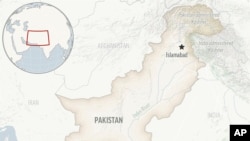Authorities in northwestern Pakistan confirmed Monday they had arrested a Chinese engineer for allegedly insulting Islam, ending overnight angry protests that called for legal action against the foreigner.
Police identified the detainee as "Mr. Tian," head of heavy transport at the China Gezhouba Group Company constructing the Dasu hydropower project about 350 kilometers north of Pakistan’s capital, Islamabad
The trouble erupted Saturday when the Chinese supervisor tried to push his local driving staff while they were collectively offering afternoon prayers at the worksite to speed up the pace of work instead.
"He went on to make insulting remarks and derogatory gestures to disparage Allah and the Prophet of Muslims," said a copy of the formal police complaint VOA received.
Police said the alleged blasphemy act had enraged the local staff, leading to angry protests Sunday evening across the Kohistan district where the project is being built, with thousands of protesters blocking the main highway linking Pakistan with China.
The demonstrations continued for several hours and only subsided pre-dawn Monday when the Chinese national was taken into custody, and community leaders were assured he would face legal action, police said, adding that traffic on the busy Karakoram Highway was later also restored.
Blasphemy is a sensitive issue in predominantly Muslim Pakistan and is punishable by death.
Suspects are often attacked and sometimes lynched by mobs. Domestic and international rights groups say allegations of blasphemy are enough to cause mob attacks and the killing of the accused. Blasphemy laws are also used to settle personal vendettas and disputes and intimidate religious minorities in Pakistan.
A Sri Lankan factory manager was beaten to death by co-workers in the country's most populous central Punjab province in December 2021 after he was falsely accused of insulting Islam. A court later sentenced six men to death for lynching the foreigner.
China has invested billions of dollars in close ally Pakistan in recent years, building roads, communication networks, ports, and power plants under Beijing's global Belt and Road Initiative.
The collaboration, known as the China-Pakistan Economic Corridor or CPEC, has brought thousands of Chinese workers and engineers to work on the mega project. The 4,300 mega-watt Dasu hydropower project is not part of the CPEC, but Chinese nationals live and work at guarded facilities in the area.
A suicide car bombing targeted a bus convoy transporting Chinese and Pakistani workers to the construction site in 2021. The blast killed nine Chinese and three local workers, the largest loss of life of Chinese citizens in Pakistan in recent years.
The deadly attack forced the Chinese company to suspend work on the Dasu Dam for several months.







